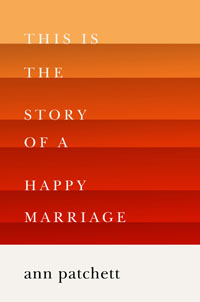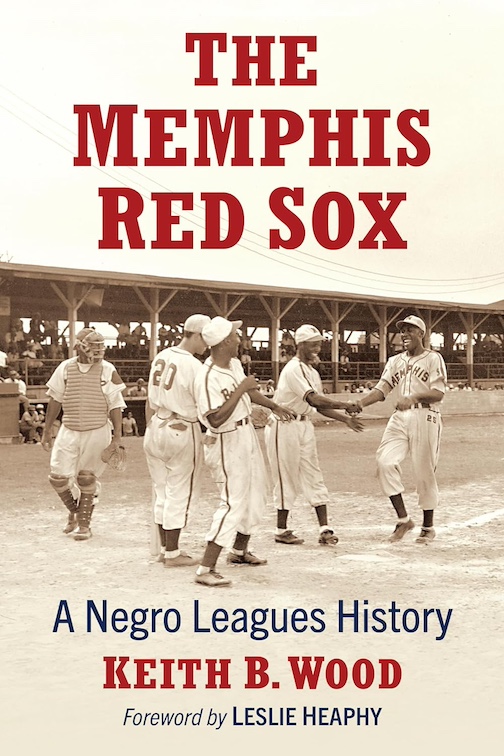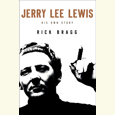The Novel of Her Life
Ann Patchett talks about her new essay collection—and the beginnings of her next novel
Ann Patchett’s 2011 novel, State of Wonder, tells the story of a Minnesota scientist who travels to the Amazon to get to the bottom of a colleague’s mysterious death and in the process finally comes to terms with a mentor she’s tried for years to forget. Patchett’s new essay collection, This is the Story of a Happy Marriage, has the author coming to terms with her own insecurities, literally climbing walls, encountering a small group of hostile natives in South Carolina, and traveling throughout the American West in an RV.
Patchett energetically resists all efforts to identify autobiographical elements in her fiction, but she has never been averse to personal writing in general: in fact, as she explains in This is the Story of a Happy Marriage, she got her start as a writer by publishing essays and features for national magazines. It’s one thing to write personally for a publication that will end up in the recycle bin almost immediately, and something entirely different to publish an autobiographical book, however, and Patchett has always preferred to issue her life’s story in incomplete, widely scattered episodes.
 But when she and Karen Hayes opened Parnassus Books to great fanfare in 2011, Patchett became for the first time a very public person in her own hometown, and this new perspective gave her a way to look with new eyes at her own personal writing over the past twenty years. The result, This is the Story of a Happy Marriage, is an essay collection with a structure that’s more akin to Patchett’s six novels—including her most famous, Bel Canto—than to her two earlier books of nonfiction.
But when she and Karen Hayes opened Parnassus Books to great fanfare in 2011, Patchett became for the first time a very public person in her own hometown, and this new perspective gave her a way to look with new eyes at her own personal writing over the past twenty years. The result, This is the Story of a Happy Marriage, is an essay collection with a structure that’s more akin to Patchett’s six novels—including her most famous, Bel Canto—than to her two earlier books of nonfiction.
As the twenty-fifth anniversary of the Southern Festival of Books was kicking off on Legislative Plaza two weeks ago, Patchett sat down for an interview in the dining room of her Nashville home. What follows is a lightly edited excerpt from an almost hour-long conversation, which is also available as a podcast.
Chapter 16: When we spoke about your last novel, State of Wonder, you said you don’t go back and read your novels. What was it like to go back and read your nonfiction for This is the Story of a Happy Marriage?
Ann Patchett: It was horrible! It was absolutely the thing that kept me from doing this book for the longest time. Every time I would publish an essay, I would just rip it out of the magazine and throw it in a big Tupperware bin, and there were probably two hundred of them in there.
How this whole book started was that my friend Niki Castle, who is mentioned a couple of times in the course of the book, moved from New York to Nashville and was trying to find a job. I said that she could come and work for me. I had never had an assistant. It was about six weeks before she found a job, and I don’t have six weeks’ worth of stuff around here to do. She went into the bin of articles and started scanning them, organizing them. After all that, she decided that she wanted to make a book out of them. So she put them together, and I couldn’t read it. I would try again and again. I would look at it, and I would just cringe. It took a long time to get to where I could read it, and then when I did read it, I thought a lot of the essays were bad. So I would dump essays out, and then I would write new essays and throw essays away and write new essays. Then, I had a book.
 Chapter 16: With your personal essays, of course, you are looking back at your life. How was re-reading the essays you’d already written so different?
Chapter 16: With your personal essays, of course, you are looking back at your life. How was re-reading the essays you’d already written so different?
Patchett: A lot of the pieces I wrote were about things that were really happening at the time. When my grandmother died or when Karl and I would have one adventure or another, I would sit down and write it. And I realized what I’d been doing for the last twenty years: I had been taking moments of my life that I really did not know what to do with and was sticking them in essays. Sort of like, Write this down, put it away, and forget about it. [Rereading them was like] finding the book with all the pressed leaves in it in one place.
Chapter 16: The pieces come from a pretty broad spectrum of time. When you forced yourself to read these things again, did you notice an evolution in your writing and your approach to nonfiction?
Patchett: Not so much. I did notice that over time I was writing for better magazines that gave me more freedom. I mean there’s nothing in this book from my early days of freelancing. There’s nothing in there from Seventeen or from Bridal Guide. The earliest one in the book is a piece I wrote for Vogue. I haven’t included the earliest pieces—not because the writing wasn’t OK but because the subject matter was dull. I’m not going to put in a piece about decorating your locker or dating your best friend’s boyfriend or whatever it was.
Chapter 16: The pieces aren’t arranged in chronological order. At different points, the reader has a knowledge of your future that you didn’t have when you were writing the piece.
Patchett: Yes, which I think is really interesting. It was very important for me to put this book together so that it would read like a novel. One thing I find that really upsets me, in a way that I would have never imagined, is when friends read the book and say to me, “Oh, I read the essay ‘Happy Marriage’ first,” or “I read the piece about Sister Nena first.” They read the book completely out of order, and it makes me crazy because I put so much thought into the order of these essays. Not just how I arranged them, but I actually wrote new essays to make it bridge properly and so it would read with the flow of a novel. I imagine that it would be like putting out an album and having people say, “I downloaded my favorite two songs from iTunes.” You would think, “No, it’s an experience. It’s the whole thing; you have to listen to it in order.”
Chapter 16: When I was reading the piece which was your introduction for Best American Short Stories 2006, I wrote in the margin, “The novel is the art of accumulation.” And this book, in its way, is an accumulation.
Patchett: It is, and my editor at The Washington Post Magazine kept saying to me, “You need to write short stories because your essays are so clearly short stories.” I feel I can write anything, but I can’t write a short story. And while we’re on the subject, isn’t it really fantastic that Alice Munro won the Nobel Prize in literature? I feel like I’m just walking around in this flow of Alice Munro love, and everyone I know has been sending me emails saying, “Isn’t this the most wonderful thing?”
Chapter 16: Well, the entire year seems to be short-story-centered. George Saunders had his collection called the best book you’ll read this year by The New York Times. Karen Russell won the MacArthur genius grant. It seems like the short story is in high critical esteem right now.
Patchett: Yes, we have a lot of really great short-story writers out there now: Maile Meloy, Nathan Englander, and Junot Diaz. It is a great time for the short story—and a great time for the essay, which reads like a short story.
Chapter 16: In your essay “My Life in Sales,” you talk about whether it would be better to be like a Fuller Brush man going door to door with your books instead of going on a book tour. And that made me think of a series of works by Marcel Duchamp, Box in a Valise, where he had miniature versions of his works, like the parody of the Mona Lisa and the urinal. He used to be a salesman himself, and so he had this valise open with all these miniature works of art so that he could show his wares to the world. In many ways, a collection of essays is similar to that.
Patchett: That actually makes me wish I could just start making miniatures. I feel very literal about that. My third novel was called The Magician’s Assistant, and in it the heroine makes architectural models for a living. If I had to have another job, that’s what I’d want to do. I would want to make little cities and tiny trees. It’s very much like the novelist’s life or the essayist’s life, to kind of shrink your circumstances down to a physical model that you can hand somebody and say, “This is what it looks like.”
I wrote “The Getaway Car,” which is a piece about all the writing advice I have. I have so many people everywhere I go come up to me and ask me questions: “How do I get a book published?” “How do I get an agent?” “My daughter wants to write. Will you meet with her?” And I thought, “Wouldn’t it be amazing if I could put it all in one place, so I would have just that, a physical object?” And I say to people, “Yes, I would be happy to have lunch with your granddaughter—on the condition that she read this essay first, which is like fifty pages long. If she gets to the end of this essay, and she can still think of anything she wants to ask me, I’ll have lunch with her.” And not once has anyone ever called me back and said, “Yes, there are still a lot of things I want to talk to you about.” So, that’s a great example of having the little thing that says: This is my life shrunk down in a package, and, here, I’m going to give it to you.
Chapter 16: So much of art is about making choices. In making choices about what to put down on the page, how much of the piece is also defined by how much and what you leave out?
Patchett: Everything. Everything is defined by what you leave out. Someone said to me yesterday, “Oh, well, this is really the story of your life. This is your autobiography in a collection of essays.” And I said, “No, these are just the little pictures that I feel like showing you. This isn’t the story of my life at all. This is more like the novel of my life.”
Everything that happened in the book is true, but what I left out is endless. I’m going to be fifty soon. What I left out is the boring stuff, but it is also the unflattering stuff. And when I say “left out,” I don’t even mean what I left out of the book of essays. I mean that I leave it out of the rotation of the stories of my life that I tell—the stories that I nurture, shape, and cherish over the years and give away to people as gifts.
You know, I didn’t just sit down and write a story about Sister Nena. It was that she told me amazing stories, which I started to tell to people. I could see people would be very engaged with those stories, and as I told them, I began to shape them, and then as I shaped them, I began to write them. The same is true with the LAPD or my grandmother. We shape things over time. There are other stories we tell, and the response from the audience isn’t always so good. Your sister gets bored when you tell that story, or people walk away, or you see their eyes glaze over. So those are the stories you drop out of your rotation. You forget. We forget.
Chapter 16: You’re turning fifty soon, and it is also close to twenty years that you and your husband have been together. Do milestones, big decennial markers, mean anything to you at all?
Patchett: No, they really don’t. And I have to say that I have Lucy [Grealy] to thank for that because Lucy was more tediously obsessed with her age than anyone I’ve ever known. She died when we were thirty-nine. And for the five years before thirty-nine, she talked endlessly about the horror of turning forty. How if she didn’t find true love by forty, she was going to leave New York, and if she hadn’t finished her book by forty, she would go to medical school, and all of these things. It was such a drama with age. And because she and I were together for so long, I learned a lesson: that age doesn’t make any difference.
When I look back now, I think, “Oh my God, you were thirty-nine when you died. And it seems, of course, like she was a baby. Another friend of ours from college is still a good friend of mine, and every year we talk on Lucy’s birthday. We said, “Oh, Lucy would have been fifty; wouldn’t she have hated that? Wouldn’t that have been the worst thing in the world that could’ve happened to her, turning fifty?” And because of that, I know that turning fifty doesn’t seem like anything to me. It’s almost like I keep going for both of us, in a way, and I am saying to Lucy in my mind, “It’s not bad. Fifty is great. Sixty is great. Dead, dead is hard, but age isn’t hard.”
Chapter 16: I’ve often wondered why you and writers of your stature even bother with interviews. You hear certain questions over and over again, so why do you even bother with them?
Patchett: I do what they tell me to do. I know that the right answer would be that I do them because I love them, but my publicist calls and says, “This is what you’re doing on Wednesday.” I really think of it as part of the job. I am not able to see every component of the picture of what I should be doing in my career, and therefore I work with people who say, You need to do these interviews, and You need to write these blog posts.
I have to fly to New York on Tuesday to shoot a video for HarperCollins because now HarperCollins wants to have videos of the authors talking about all sorts of different subjects for librarians, for the academics, and for dog lovers. And I will sit there, and they will take pictures of me talking about different things. I can’t get my head around that at all. Why do I need to do that? Is that really going to sell books? I understand that interviews really sell books because a lot of people are listening to a radio program, and I will not be able to go out there and actually meet them. They might say, “Well, she sounds kind of interesting, and I’m going to go out and take a look at that book.” The video? No, if you care enough about my career that you’re going to go click on annpatchett.com, which my publisher invented and keeps up, and watch a video of me, you’re probably already in a place where you’re going to get the book, anyway.
Chapter 16: I find with the podcast that more people tend to listen to them after they’ve read the book. It’s almost more of a value-added proposition than anything else.
Patchett: That’s the video, then. The person who ran the video department who was trying to sell me on this idea gave me a lot of examples that did not sell me. My favorite one was, “Well, take Elmore Leonard, for example. He was one of our authors, and now he’s dead. Now his fans go on and watch his videos because we did this and have the video of him. And the fans really like it, and I know you’re not dead, and I know you’re not going to die any time soon, but I mean sooner or later you’ll die, and it’ll be really great that we have this video.” And I thought, “Wow, this is not making me want to get on a plane and go to New York and shoot video.”
Chapter 16: Imagine if you would let them do a death mask of you, how much would that mean to your Victorian readers.
Patchett: Absolutely, with every purchase of the book, you’ll receive a death mask of Ann Patchett!
Chapter 16: I’m sorry but I have to be very rude at this point, and instead of expressing gratitude for this work you’ve provided us, I have to ask you, “What’s next?”
Patchett: There’s nothing rude about that. I’ll tell you: I’m going to write a novel. I haven’t started writing, but I know pretty much what it is, and after book tour is over, I will start it.
There is to my mind kind of an interesting path: Niki Castle quits her job in New York and moves to Nashville because she’s had it with New York. She doesn’t have a job and comes to work with me and puts this book together, which I can’t stand and can’t deal with. The point at which I start to really take this seriously as a book is when I open the bookstore. When I open the bookstore, my life goes from very private and very guarded to completely public and completely open. And now I am sort of like a famous person in Nashville because I’m the person who opened the bookstore. My whole profile and relationship to the community has changed. I’m so much more out there than I’ve ever been, and because of that, I started to think, OK, I can publish a personal book. My personal life is much more known, and I can do that. The bookstore gave me the courage to actually go through with Niki’s plan for me.
And because now I’ve written this very personal book, the next novel that I write is going to be the novel that I should’ve written when I was twenty-five. I really want to write a roman à clef. The book isn’t that autobiographical but springs out of events in my life. I can look over the novels I’ve written, and I really do feel that I have tried so hard not have any personal, any autobiographical, readily identifiable information in my novels, that I’ve bent over backwards to exclude. In a way, I’m not sure that it’s right. And so why not just write the novel that I spent my whole life trying not to write? That’s what I want to do now.
I just read a really interesting book of Pat Conroy’s, The Death of Santini. He’s going to be in Nashville at the end of October, and I’m going to interview him on the stage, so I read a couple of his novels, and then I read this book. The Great Santini was a novel that was based very much on his family. The Death of Santini is a memoir, and he basically says in the book, “I’ve been writing fictionalized versions of my family for my whole life, and I’m sick of it. I’m just going to put it all out there and tell the truth about everything because I want to get this out of my system.” So I wonder if the journey isn’t always somehow about that relationship, the push and pull between the private and the public. How much do we keep secret? “Secret” isn’t quite the right word: sort of shaded, shadowed, held back in a way. And, then, what story we make available to the public. I feel like this book, This Is the Story of a Happy Marriage, is a step in the process of working all the stuff out, and that the next novel will be the next step.
Chapter 16: But repression does wonders for art.
Patchett: Doesn’t it? Yeah, but I’m tired of it, too. Again, this is about being fifty. I feel like that I tried very hard to not ever write anything that would upset my parents. And what I realized is that my parents couldn’t care less. They’re very proud of me; they’re very happy for me, and I don’t need to think the way a fourteen-year-old would think anymore. I can embrace whatever I want to embrace. I can use whatever I want to use.
Chapter 16: In the book, you mention your past reluctance to get married and how the relationship continued for eleven years before you got married. And how much time it had freed up that you were no longer talking about why you weren’t getting married. You might do that now with not avoiding the personal in your fiction.
Patchett: Yeah, exactly. I’m very interested now that my husband is obsessed with whether or not to retire. It’s the thing he has talked about for a really long time. And sometimes I say, “If you just retired, think of all the other things we talk about. Think of the conversational room that would open up.” Because it’s become the focus of everything in his life. So if he retired, and now that we’re married, boy, we could just talk about Syria all day long.
On November 4, 2013, at 6:15 p.m., Ann Patchett will discuss This is the Story of a Happy Marriage at Ingram Hall in the Blair School of Music at Vanderbilt University in Nashville. The event, part of the Salon@615 series, is free and open to the public.





